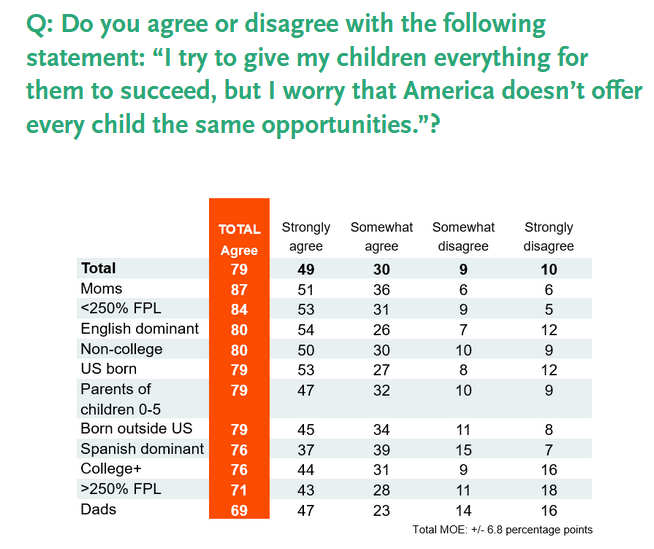
Share On Social!
Latino parents are hopeful that their children will have more opportunities to succeed in life than they did, but recognize that inequities may limit them, according to a new study by the Robert Wood Johnson Foundation (RWJF).
To create the Raising the Next Generation study, RWJF, together with the research firm PerryUndem, interviewed over 2,000 parents and caregivers (400 of which were Latino) on their perceptions of inequity and discrimination in the U.S. They also asked about optimism about the future and challenges their children might experience.
The survey revealed many interesting findings about how Latino parents perceive inequities and how income and immigration affect their perceptions.
Findings from the Raising the Next Generation Study
When it comes to future generations, the majority of Latino parents are optimistic that their children will be able to create a better future.
However, the survey found that this varies based on whether the parents were immigrants.
“Creating a better future for their kids is important and they are doing what they can to realize it. Parents born outside the U.S. are more likely to express optimism than parents who are U.S. born,” according to the survey report.

Latino parents also noted several different ways that their families can succeed against odds.
“Latino parents also report relying on a strong work ethic, creativity in solving problems, and a feeling that they have the power to change their situation to help their family succeed,” according to the survey report.
While Latino parents are optimistic, they also recognize that inequities will impact their children.

“The optimism and hope expressed by Latino parents and caregivers lives alongside a recognition of inequities. Majorities report that despite everything they do to help their children succeed, they worry that America does not offer every child the same opportunities. This is especially true of moms and parents and caregivers with lower incomes,” according to the survey report.
Especially among non-English speakers and low-income families, Latino parents are concerned about the effects of racism and discrimination on their children.
“About half of Latino parents and caregivers are concerned that their children will experience racism and discrimination which will limit their opportunities. Spanish dominant parents and those with lower incomes are most concerned,” according to the survey report.

Unfortunately, the effects of discrimination on Latinos are widespread.
“Racial/ethnic discrimination impacts educational attainment, which, in turn, impacts future educational, health, social, and career opportunities for people of color,” according to a Salud America! research review.
This can also lead to negative effects on mental health for Latino children.
“Discrimination, poverty, violence, and bullying affect Latino children’s depression and stress levels,” according to a Salud America! research review.
 Latino parents are concerned about the effects of racism on their own lives, too.
Latino parents are concerned about the effects of racism on their own lives, too.
“Three-quarters of Latino parents and caregivers say that systemic racism and discrimination can make it harder for someone like them to get a good paying job or get good medical care. Parents and caregivers with lower incomes and those who are Spanish dominant are more likely to agree,” according to the survey report.
Thankfully, policy and system changes can support Latino families through difficult times.
How Can We Help Latino Families?
To fight inequities that prevent Latino children from having the opportunity to succeed, comprehensive government policy is needed.
According to RWJF’s survey, the majority of Latino parents support policies like paid family leave, improved healthcare, housing, and tax credits to help their children be successful in life.
Some policies, like a Federal Job Guarantee, are being brought up with the new administration to help address inequities for Latinos.
Another way you can help address inequities for Latinos is by downloading a Health Equity Report Card.
The Health Equity Report Card by Salud America! at UT Health San Antonio lets you see many local children are living in poverty and food deserts, what access to education and healthcare your neighbors have, and how many households get access to SNAP food benefits.
Then you can email your Health Equity Report Card to community leaders, share it on social media, and use it to make the case to address inequities where help is needed most!
By The Numbers
3
Big Excuses
people use to justify discriminatory behavior



